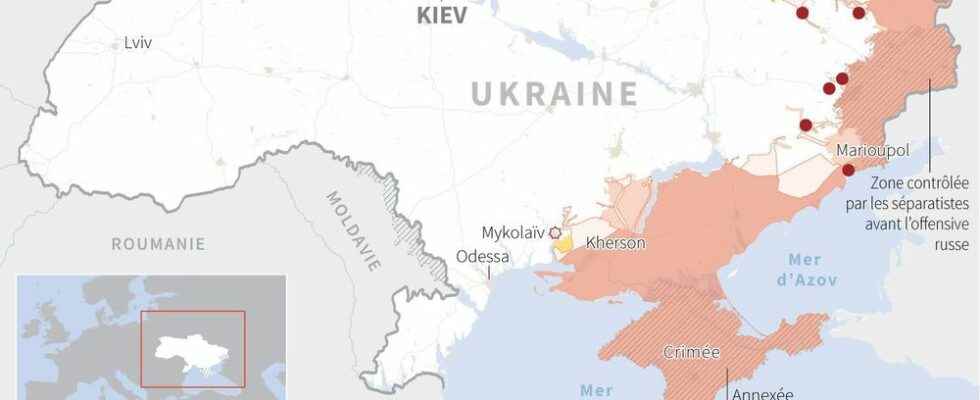From Turkey, Russian Deputy Defense Minister Alexander Fomin, face hitherto in shadow, takes on the light. Tuesday, at the end of the negotiations between the Ukrainian and Russian delegations, his speech must be a turning point. More than a month after the invasion of the Russian army in Ukraine, “it was decided, to increase confidence, to radically reduce military activity in the direction of kyiv and Cherniguiv”, he explains. The commitment confirms the European chancelleries, in particular German and French, for having applied themselves to maintaining and nurturing, for several weeks, the dialogue with the country led by Vladimir Putin. Some countries foresee a possible de-escalation.
To achieve such a breakthrough, Ukraine is ready to accept significant commitments. The country led by President Zelensky could become militarily neutral if it obtains an international agreement providing it with guarantors of its security. It was also decided to set in stone the impossibility of hosting foreign military bases and adopting a “non-nuclear” status. A series of commitments to place the two nations on the path to peace. However, 48 hours after Moscow’s announcement, Russia seems not to respect what it has committed to. From there to speak of “double game”?
Ukrainian distrust
Volodymyr Zelensky is suspicious anyway. “We don’t believe anyone, not a single beautiful sentence,” the Ukrainian leader warned on Thursday morning. The spokesman for the Ukrainian Ministry of Defense, Oleksandre Motuzyanyk, had pointed out on Wednesday a configuration, on the ground, still very far from the promise made the day before. If the Ukrainian authorities underline the departure of some units from kyiv and Cherniguiv, they deplore the absence of “a massive withdrawal of Russian troops from these areas”, contrary to the declaration of the day before.
On the side of Chernobyl, the Russian forces begin their withdrawal from the nuclear power station which they had taken possession of at the end of February. North-west of kyiv, Gostomel airport, also occupied, is in the process of being abandoned. These units retreated to Belarus to resupply themselves with weapons and food. The Russian authorities have promised to put their men back on the Donbass and Crimea front, in the east of the country. It is currently very difficult to know if all the troops are affected by this redeployment. Above all, aren’t these military maneuvers a decoy? We remember that when launching the offensive, on February 24, on Ukrainian soil, Vladimir Putin had mentioned an operation in the east of his neighbor’s territory.
Late move east
Only a few days ago, Moscow announced that it was reviewing its plan of operation. New objective: to concentrate its efforts on “the liberation of Donbass”. A communication which contradicts its elements of language of the beginning of the war and reveals its warlike intentions. If this change of posture raises questions about its effectiveness, it focuses above all on its military reality. The Kremlin’s announcement to refocus towards the East was not accompanied by an immediate movement of its soldiers. Here again, Russian diplomacy seems adept at the discrepancy between words and deeds. But less in the last few hours…
Russian forces are “repositioning themselves”, NATO Secretary General Jens Stoltenberg warned on Thursday, who also fears “additional offensives”. During a press conference, the former Norwegian Prime Minister estimated that Russia “is trying to regroup (its forces) and strengthen its offensive on the Donbass region and at the same time it maintains the pressure on kyiv and ‘other cities”.
Update on the Russian advance in Ukraine as of March 31.
AFP
Russia says not to bomb civilians
The other thing that Russia doesn’t really seem to be doing what it says is bombing. The Russian Ministry of Defense keeps repeating that his country only targets military units and does not target civilian populations. In Mariupol, however, the images of destroyed houses, of maternity wards reduced to ashes or of classrooms ravaged by bombs do not really seem to point in the direction of total respect for the code of war. 160,000 inhabitants are still stranded in deplorable conditions because kyiv accuses Moscow of not respecting the ceasefire. Russia denies and counters that its neighbor is using its own people as a shield.
As a result, Ukraine tabled a resolution approved on March 4 by the United Nations Human Rights Council denouncing the war crimes of its military adversary. A commission of inquiry has been set up to shed light on these allegations.
On Wednesday, despite Russia’s promise to withdraw from Kyiv and Cherniguiv, the mayors of both cities reported “colossal attacks”. “They even increased the intensity of the strikes,” insisted Vladyslav Atroshenko, the mayor of Cherniguiv. Civil infrastructure, including a library and a shopping center, have been targeted, says the city councilor. Dangerous to believe in the promised de-escalation on Tuesday, under these conditions…
